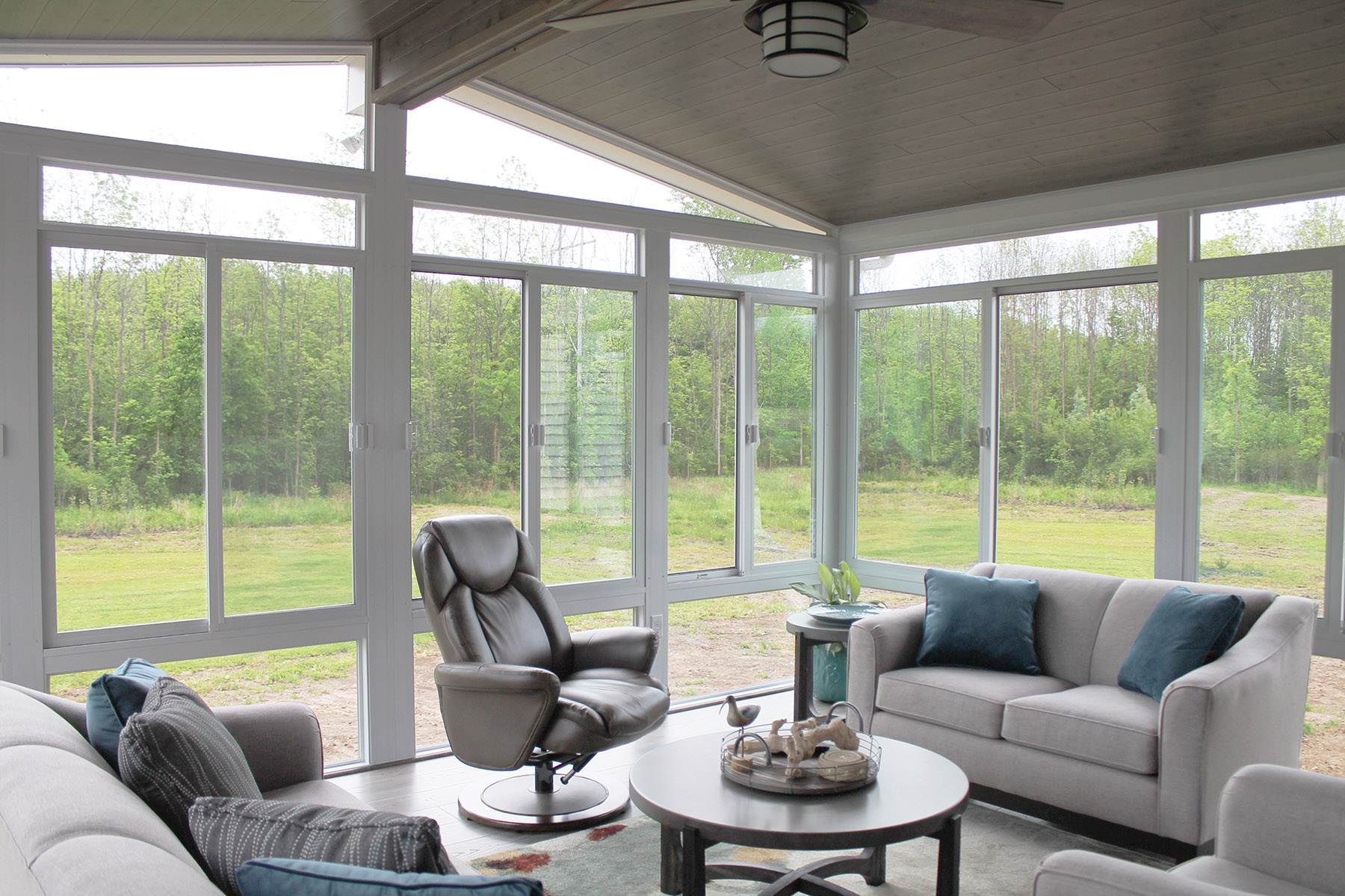
Looking to bring more natural light into your home without worrying about the changing seasons? A sunroom might be the perfect solution. With floor-to-ceiling windows and a design that blends the indoors with the outdoors, a sunroom offers a bright, relaxing space where you can enjoy the beauty of nature year-round.
Whether you want a cozy spot to sip your morning coffee or a sunny retreat to entertain guests, a skilled sunroom contractor can help make it happen. They’ll handle everything from design to installation, ensuring your sunroom is functional, stylish, and tailored to your home. Ready to bring the outdoors in? Let a sunroom contractor turn your vision into a beautiful reality!
What should I consider when hiring a sunroom contractor?
When hiring a sunroom contractor, several important factors must be considered to ensure you get the best quality and value for your investment. Here’s what you should keep in mind:
- Experience and Expertise: Look for contractors with a proven track record building sunrooms. A contractor experienced in sunroom projects will be familiar with the necessary materials, design elements, and local building codes. Ask for examples of past projects and check their portfolio to ensure they have the expertise to handle your needs.
- Licensing and Insurance: Verify that the contractor is fully licensed and insured. A licensed contractor complies with local regulations and ensures that the work meets safety standards. Insurance is crucial to protect you from liability in case of accidents or damage during construction.
- Customer Reviews and References: Read reviews and testimonials from previous clients to gauge the contractor’s reputation. Ask the contractor for references and take the time to contact them to learn about their experience. Positive feedback from satisfied customers is a good indicator of the contractor’s reliability and quality of work.
- Design and Customization Options: Ensure the contractor offers flexibility and customization options that suit your style and needs. Whether you want a traditional sunroom, a solarium, or a modern glass enclosure, the contractor should be able to work with you to bring your vision to life.
- Materials and Energy Efficiency: Ask about the materials the contractor uses and their energy efficiency. High-quality materials and energy-efficient glass can enhance the comfort and longevity of your sunroom, saving you money on heating and cooling costs. Inquire about weather resistance and durability, especially in extreme weather conditions.
- Timeline and Communication: A good contractor should provide a clear timeline for the project, including start and completion dates. Effective communication is essential throughout the process. Ensure the contractor is responsive to your questions and keeps you informed about the project’s progress.
- Cost and Contract: Get a detailed estimate that outlines the total cost, including labor, materials, and any potential extra expenses. Ensure the contractor provides a clear and detailed contract specifying the scope of the work, payment terms, and any warranties offered. Be wary of quotes that seem too low, which may indicate poor quality or hidden costs.
Considering these factors, you’ll be better equipped to choose a reliable and skilled sunroom contractor who can deliver a high-quality result that meets your expectations.
How much does building a sunroom that brings natural light into your home year-round cost?
The cost of building a sunroom that brings natural light into your home year-round can vary depending on several factors, including size, design, materials, and location. Here’s a breakdown of what you might expect:
Types of Sunrooms and Costs
- Three-Season Sunroom ($10,000 – $40,000): This type of sunroom is typically less expensive because it may not include insulation or heating/cooling systems. It is suitable for spring, summer, and fall use but less comfortable during winter.
- Four-Season Sunroom ($25,000 – $80,000+): Designed for year-round use, four-season sunrooms include insulation, energy-efficient windows, and heating/cooling systems, making them more expensive but functional throughout all seasons.
- Conservatory or Solarium ($30,000 – $100,000+): These all-glass structures are more elaborate, featuring glass ceilings and walls that offer maximum natural light. Their design complexity and materials make them the most expensive sunroom option.
Factors Influencing Cost
- Size: The larger the sunroom, the higher the cost. A small sunroom can start around 100-200 square feet, while larger designs can exceed 500 square feet.
- Materials: Premium materials like double-pane, energy-efficient windows, insulated roofing, and high-quality flooring can increase the overall cost. Using aluminum, vinyl, or wood for framing also affects pricing.
- Customization: Custom design features like skylights, high-end finishes, or integrated technology (like automated shades) can add to the price—the more personalized the sunroom, the higher the cost.
- HVAC Integration: A year-round sunroom typically requires integration with your home’s heating and cooling system or the installation of standalone systems, which adds to the cost.
Location and Permits
Local labor rates, permits, and building codes can also impact costs. The permitting process and regulations may require additional construction elements in some areas, driving the total cost.
Overall Estimated Costs
- A basic three-season sunroom starts around $10,000 to $30,000.
- Depending on size and materials, a four-season sunroom typically costs $25,000 to $80,000 or more.
- High-end custom designs or solariums can range from $50,000 to $100,000+.
While the cost can vary widely, a sunroom is a valuable investment that increases your home’s square footage, appeal, and enjoyment year-round.
What are the benefits of adding a sunroom to your home?
Adding a sunroom to your home offers numerous benefits, enhancing your living space and overall value. Here are some key advantages:
- Increased Natural Light: Sunrooms bring natural light into your home, which is one of their main benefits. Large windows and glass walls let sunlight in, creating a cheery ambiance. Natural light can improve mood, energy, and sleep, making your house more appealing and enjoyable.
- Year-Round Enjoyment of the Outdoors: No matter the weather, a sunroom lets you enjoy nature from home. You can enjoy your garden, backyard, or landscape from a climate-controlled room on a brilliant summer day or a snowy winter afternoon.
- Versatile Living Space: Sunrooms can be used for several reasons. It might be a reading nook, family room, home office, fitness space, or dining area. Sunrooms are great home additions because they can adapt to your changing needs and lifestyle.
- Increased Home Value: Potential buyers like sunrooms, which can increase your home’s value. A well-designed sunroom adds square footage and appeal while encouraging relaxation and outdoor enjoyment. This extra value often boosts ROI.
- Energy Efficiency: Energy-efficient components like insulated glass and high-quality frames keep modern sunrooms comfortable year-round. Built with energy-efficient windows and materials, a sunroom can reduce energy expenditures by decreasing artificial lighting and heating.
- Connection to Nature: A sunroom lets you experience nature without insects, heat, or cold. It provides a calm sanctuary where you can rest and enjoy the view, connecting you to nature and giving serenity to your everyday routine.
- Health Benefits: A sunroom’s increased solar exposure boosts Vitamin D levels, which improve bone, immunological, and overall health. Additionally, spending time in a naturally light place can reduce stress and boost mood.
- Entertainment Space: Sunrooms are ideal for entertaining. They provide a sunny, lovely environment for mingling, whether for a small or large occasion. They may extend your living or dining room, making it suitable for parties, family gatherings, and quiet dinners.
Adding a sunroom enhances your home by increasing living space, bringing in natural light, boosting home value, and providing a versatile area for relaxation and entertainment. It’s a worthwhile investment that enhances both your lifestyle and property.
Can a sunroom be used year-round in all climates?
Yes, a sunroom can be used year-round in all climates, but this largely depends on its design, insulation, and heating and cooling systems. Here are factors to consider to ensure year-round usability in any climate:
- Insulation: A sunroom needs insulation to be pleasant year-round, especially in colder climates. Four-season sunrooms include insulated walls, ceilings, and floors to reduce winter heat loss and summer gain. Insulated double- or triple-pane windows decrease drafts, boost energy efficiency, and regulate temperature.
- Energy-Efficient Windows: High-quality, energy-efficient windows are crucial for year-round sunrooms. Low-E glass reduces heat transfer keeping the space cooler in the summer by reflecting heat and warmer in the winter by retaining heat. This ensures comfort no matter the season.
- Heating and Cooling Systems: To keep your sunroom cool, you may need to connect it to your home’s HVAC system or install a ductless mini-split. The sunroom can be heated in winter and cooled in summer. Other air circulation possibilities include mobile heaters, radiant floor heating, and ceiling fans.
- Weatherproofing: Sunrooms need high-quality roofing, weatherstripping, and strong structural materials like aluminum or vinyl to protect them from wind, rain, snow, and humidity in extreme weather. Proper window and door sealing eliminates drafts and moisture for year-round comfort.
- Four-Season Design: A four-season sunroom is built for year-round use, unlike a three-season sunroom, which may lack insulation and temperature control. Four-season sunrooms can withstand scorching summers and cold winters because they maintain a moderate indoor climate.
Climate-Specific Considerations
- Cold Climates: In areas with harsh winters, you’ll need robust insulation, high-performance windows, and efficient heating systems. Using materials like thermally broken aluminum can prevent heat loss.
- Hot Climates: In warmer climates, focus on UV-blocking windows, ventilation systems, and possibly ceiling fans or air conditioning to keep the space cool.
A well-designed sunroom with insulation, energy-efficient windows, and climate control systems can be used year-round in any climate. A four-season sunroom is the best option for those looking to enjoy the space throughout the year, no matter where they live.
Brighten Your Home Year-Round with Sunrooms
At Bull Mountain Outdoor Living , we specialize in designing and building sunrooms that brighten your home year-round. Our expert team creates custom sunrooms that flood your space with natural light while providing year-round comfort, no matter the weather.
Whether you envision a cozy winter retreat or a sunny summer haven, our sunrooms are crafted with high-quality materials and energy-efficient features to enhance your living experience. Relax and enjoy nature from your home with a sunroom that suits your style and needs. Contact us today to start your journey to a brighter, more inviting home!








